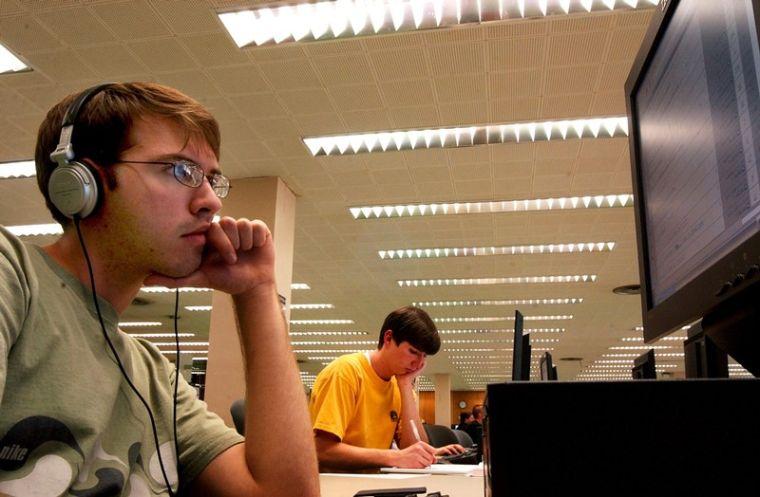Having a computer and access to the Internet has become a campus-wide necessity in the past few semesters.
Professors are increasingly using the Web to post notes and assignments and to test students. As computers demand more of students’ attention, some say information technology is far from perfect.
“Teachers depend on [students] way too much to use computers,” said Leah Beauchamp, a psychology freshman. “I understand not printing notes for 1,000 students, but they shouldn’t make us check Blackboard everyday.”
Beauchamp said one of her teachers was constantly telling the class to check Blackboard or else they would miss something.
“She scared us into using it, and then she really didn’t post anything of significance,” she said.
Charrity Pope, an advertising freshman, said she logs onto paws ten to 12 times a day. “I like [PAWS] because you might lose handouts, but you can just get on the Internet and print them,” she said.
Some students say they spend hours on computers to accomplish everything in their workload.
“I spend about 13 to 14 hours a week on the computer at work and in the dorm labs,” said Lacey Burns, an anthropology sophomore. “It is easy to get lost or confused if all [teachers] give is stuff online.”
There are nine public access labs across campus, totaling 500 computers for students. Each lab has its own technology department to fix any problems.
“At any given time in Middleton, there is always one technology worker,” said Zoltan Milic, a graduate student and manager for the Office of Computing Services. “Maintenance is done every single day.”
The constant care for the computers seems to pay off, according to students who frequent the labs.
“The [Middleton] labs are quiet, and the computers are reliable,” said Jonathan Wilson, an environmental management systems sophomore.
Some find it easier to use the residential hall computer laboratories, though they say the facilities are not as nice as other public access computer labs.
“They really need new computers in McVoy,” Burns said. “The lab is infested with ants, the tables are breaking and computers are always disconnected from the Internet, or you can’t print because of paper jams.”
Pope, who does not own a computer, said she is an avid campus user.
“I’ve never had a problem with the [Middleton] library and the Union computers, but I don’t think it’s fair that they advertise nice [residential hall computer] facilities and make us pay technology fees, and I don’t see any results,” Pope said.
Some students battle with online assignments.
Beauchamp said her math class used Maple TA, a Web site where students submit their homework online.
“You can work out the problems, but if you type one thing wrong, it marks it completely wrong,” she said, “Math is about partial credit. I am going to fail without it.”
Despite student protests, some faculty members find that electronic learning has allowed them to teach more efficiently.
“[The University’s] technology is phenomenal. It has improved my ability to teach,” said Tracey Rizzuto, psychology assistant professor. “The ability to use multimedia in the classroom is huge. And knowledge retention is greater when [students] are able to use more of their senses.”
One of the more recent computer developments on campus is computer-based testing.
Rizzuto said, “The benefits are numerous. There is flexibility for students to be able to sign up as opposed to me assigning a date. The testing items are selected from a test bank, and this makes duplications [of tests] minimal, so cheating is minimized.”
Rizzuto is as new to computer testing as some of her students and is aware of the problems they face.
“In terms of the downside of [computer based testing], I can’t possibly be in every test and cannot answer questions,” she said. “There is also the random probability factor that since answers are selected from the question bank, one test may be harder than another.”
Some students like the new testing style.
“I took my biology test on [a computer] yesterday,” Wilson said. “I liked it because you get to see your grade faster.”
Campus grows more computer-dependent
February 23, 2005
Campus grows more computer-dependent




